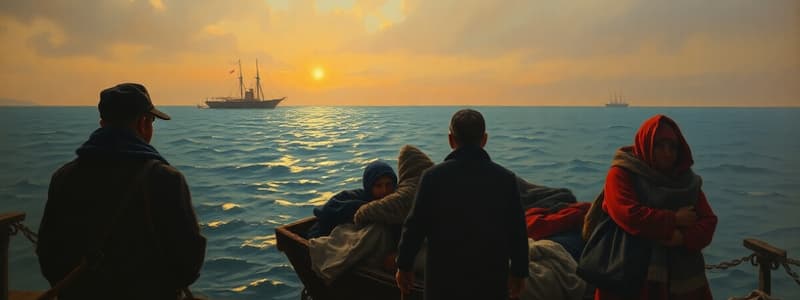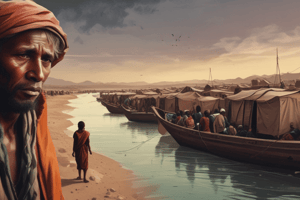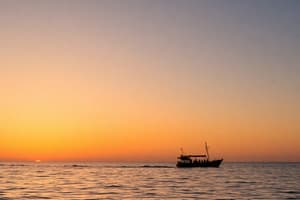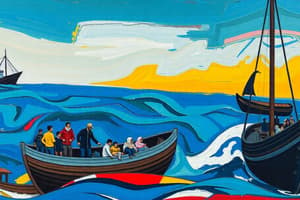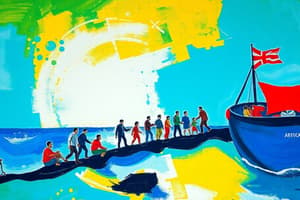Podcast
Questions and Answers
Why did the smugglers choose a cloudy, moonless night for the crossing?
Why did the smugglers choose a cloudy, moonless night for the crossing?
- To ensure they wouldn't encounter other boats.
- To take advantage of cooler temperatures.
- To decrease the likelihood of being detected by the Greek Coast Guard. (correct)
- To make it easier to navigate by the stars.
What is the primary source of anxiety for the people in the dinghy?
What is the primary source of anxiety for the people in the dinghy?
- The overcrowding of the boat.
- The failing motor and deflating boat. (correct)
- The possibility of being caught by the authorities.
- The lack of food and water.
Ahmed's memory of stories about defective life jackets suggests what underlying fear?
Ahmed's memory of stories about defective life jackets suggests what underlying fear?
- Distrust of the smugglers and the equipment they provided. (correct)
- Fear of being separated from his father.
- Regret for leaving his family behind.
- Anticipation of a long and difficult journey.
What is the significance of the stainless-steel watch that Ahmed's father gives him?
What is the significance of the stainless-steel watch that Ahmed's father gives him?
What does Ahmed's father's calm demeanor likely indicate, despite the dire situation?
What does Ahmed's father's calm demeanor likely indicate, despite the dire situation?
The phrase 'Where was Europe? Where was the rest of the world?' suggests Ahmed's feeling of:
The phrase 'Where was Europe? Where was the rest of the world?' suggests Ahmed's feeling of:
What does the father's assurance, 'You won't have to,' imply when Ahmed says he can't swim?
What does the father's assurance, 'You won't have to,' imply when Ahmed says he can't swim?
What is the most likely reason Ahmed's father gave him the watch?
What is the most likely reason Ahmed's father gave him the watch?
How does the author create a sense of dread and uncertainty in the passage?
How does the author create a sense of dread and uncertainty in the passage?
When Ahmed thinks about his mother, sisters, and grandfather, and wonders if his death will be worse than theirs, the reader can infer:
When Ahmed thinks about his mother, sisters, and grandfather, and wonders if his death will be worse than theirs, the reader can infer:
Why does Ahmed's father put the inner tube around Ahmed before jumping into the water?
Why does Ahmed's father put the inner tube around Ahmed before jumping into the water?
What does Ahmed's father mean when he says, "For a moment, I must leave you?"
What does Ahmed's father mean when he says, "For a moment, I must leave you?"
Why does the author include the detail that the woman in front of Ahmed is holding a baby in a sling?
Why does the author include the detail that the woman in front of Ahmed is holding a baby in a sling?
What is significant about the fact that the refugees are from various places like Syria, Afghanistan, and Iraq?
What is significant about the fact that the refugees are from various places like Syria, Afghanistan, and Iraq?
What is the most likely reason Ahmed's father asks if anyone else can swim?
What is the most likely reason Ahmed's father asks if anyone else can swim?
The engineering student from Homs is now acting as the captain. What does this imply about the journey?
The engineering student from Homs is now acting as the captain. What does this imply about the journey?
What can be inferred from the wiry man handing his jacket and shirt to the woman to be folded?
What can be inferred from the wiry man handing his jacket and shirt to the woman to be folded?
What is the significance of the phrase "Ahmed lurched forward to grab him, but it was too late"?
What is the significance of the phrase "Ahmed lurched forward to grab him, but it was too late"?
In the line “His father slid into the dark water like an eel,” what does this simile suggest about his father’s actions?
In the line “His father slid into the dark water like an eel,” what does this simile suggest about his father’s actions?
What does the phrase "This thankless duty had earned him an oblong orange buoy" suggest about the captain's role?
What does the phrase "This thankless duty had earned him an oblong orange buoy" suggest about the captain's role?
Why did Ahmed's father refuse to take the inner tube back from Ahmed?
Why did Ahmed's father refuse to take the inner tube back from Ahmed?
What action did the passengers take to lighten the boat, and what did this act symbolize for Ahmed?
What action did the passengers take to lighten the boat, and what did this act symbolize for Ahmed?
How does the author use Ahmed's memory of the dabke to enhance the reader's understanding of his relationship with his father?
How does the author use Ahmed's memory of the dabke to enhance the reader's understanding of his relationship with his father?
What event caused Ahmed to be 'jolted from his memories,' and how did this event affect the journey?
What event caused Ahmed to be 'jolted from his memories,' and how did this event affect the journey?
What does the phrase '...as if considering the worth of those inside' imply about the wave?
What does the phrase '...as if considering the worth of those inside' imply about the wave?
How did the sideways wave impact the swimmers and the buoy?
How did the sideways wave impact the swimmers and the buoy?
Given the events described, what is the most likely theme of this passage?
Given the events described, what is the most likely theme of this passage?
What does the detail of the passengers shouting 'Praise be to God!' after the boat jerked forward suggest about their state of mind?
What does the detail of the passengers shouting 'Praise be to God!' after the boat jerked forward suggest about their state of mind?
Considering the father's actions and the overall situation, what can be inferred about the father's character?
Considering the father's actions and the overall situation, what can be inferred about the father's character?
How does the changing weather in this passage serve as a metaphor for the characters' emotional state?
How does the changing weather in this passage serve as a metaphor for the characters' emotional state?
Flashcards
Dinghy
Dinghy
A small, inflatable boat, often made of rubber or similar material.
Smuggling
Smuggling
Illegally transporting people or goods, often across borders.
False comfort
False comfort
Giving a false sense of safety or assurance.
Powerlessness
Powerlessness
Signup and view all the flashcards
Life jacket
Life jacket
Signup and view all the flashcards
Defective
Defective
Signup and view all the flashcards
Invisibility
Invisibility
Signup and view all the flashcards
Aegean Sea
Aegean Sea
Signup and view all the flashcards
Deflating
Deflating
Signup and view all the flashcards
Lesbos
Lesbos
Signup and view all the flashcards
Bailing Out/Lightening the Load
Bailing Out/Lightening the Load
Signup and view all the flashcards
"Allahu Akbar"
"Allahu Akbar"
Signup and view all the flashcards
Inner Tube
Inner Tube
Signup and view all the flashcards
Treading Water
Treading Water
Signup and view all the flashcards
Medley
Medley
Signup and view all the flashcards
Ashamed
Ashamed
Signup and view all the flashcards
Thankless Duty
Thankless Duty
Signup and view all the flashcards
Oblong
Oblong
Signup and view all the flashcards
Smugglers
Smugglers
Signup and view all the flashcards
Desperate
Desperate
Signup and view all the flashcards
Buoy
Buoy
Signup and view all the flashcards
Conferring
Conferring
Signup and view all the flashcards
Jerked
Jerked
Signup and view all the flashcards
Pitched
Pitched
Signup and view all the flashcards
Pinwheel
Pinwheel
Signup and view all the flashcards
Taut
Taut
Signup and view all the flashcards
Whitecaps
Whitecaps
Signup and view all the flashcards
Ebb
Ebb
Signup and view all the flashcards
Drenched
Drenched
Signup and view all the flashcards
Study Notes
- Set on a cloudy, moonless July night, a group of refugees is attempting to cross the Aegean Sea from Turkey to Greece in an inflatable rubber dinghy.
- The dinghy is overcrowded with eighteen men, three women, and four children, many without life jackets or swimming skills.
- The boat is deflating, and the motor won't start, leading to panic among the passengers.
Ahmed's Fears
- Ahmed, a fourteen-year-old boy, worries about the defective life jacket and the stories he heard about them sinking people.
- He is comforted by his father, but the smell of bodies and the terrified gazes of the other passengers reveal the gravity of their situation.
- Ahmed realizes that he cannot swim
Father's Sacrifice
- Ahmed's father attempts to reassure the woman holding a baby.
- The father gives his inner tube to Ahmed and jumps into the water to help pull the boat, along with two other men.
- The father tells Ahmed that he must leave him for a moment and asks for forgiveness.
- Ahmed is reminded of happy times with family before the war in Syria.
- Ahmed is proud that his father is leading them.
Disaster Strikes
- A wave sweeps over the swimmers, ripping the buoy off the rope and tossing it into the darkness.
- The passengers start shouting and shining flashlights, but Ahmed's father disappears.
- At the end, Ahmed is alone, with no sign of his father, facing the endless waves.
Studying That Suits You
Use AI to generate personalized quizzes and flashcards to suit your learning preferences.
Related Documents
Description
A group of refugees attempts a dangerous crossing of the Aegean Sea. Overcrowded and facing equipment failure, panic sets in as a young boy, Ahmed, confronts the dire situation. His father makes a heartbreaking sacrifice to save his son and others on the boat.
